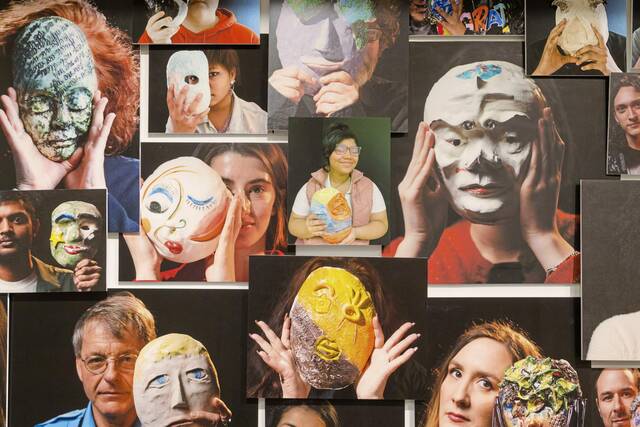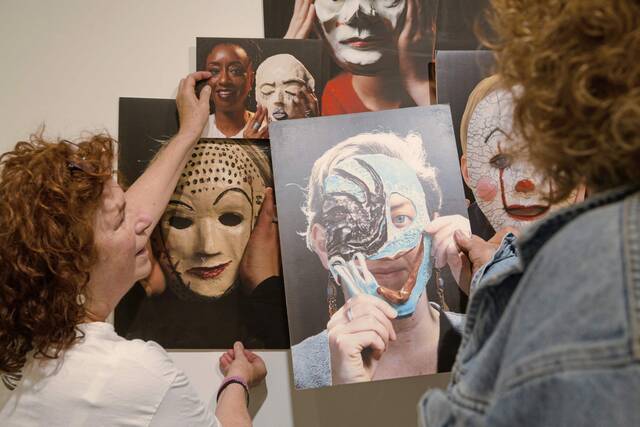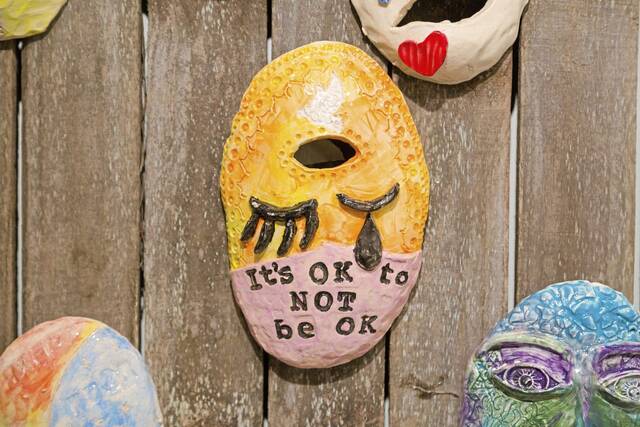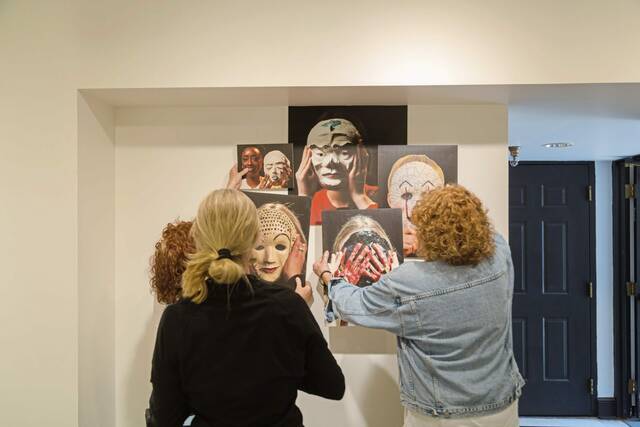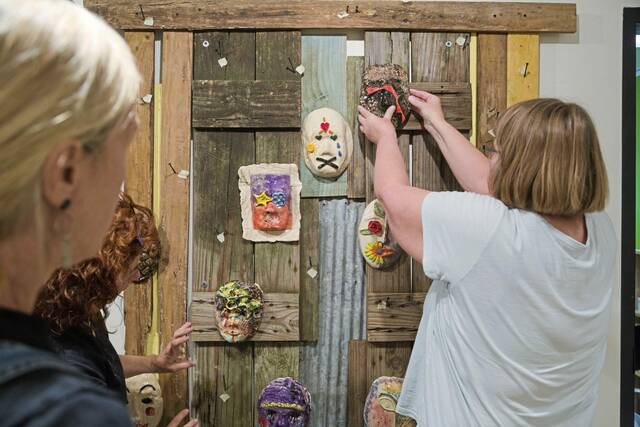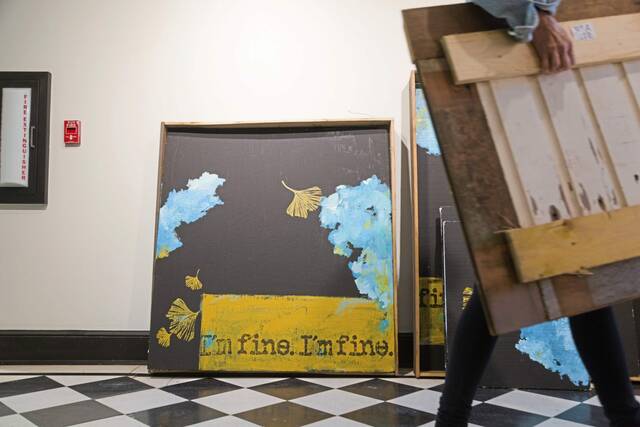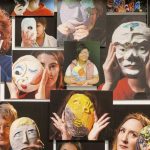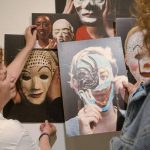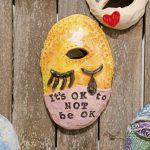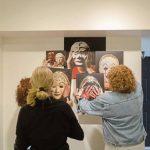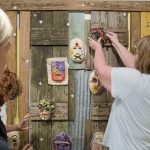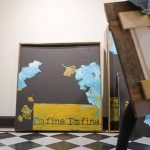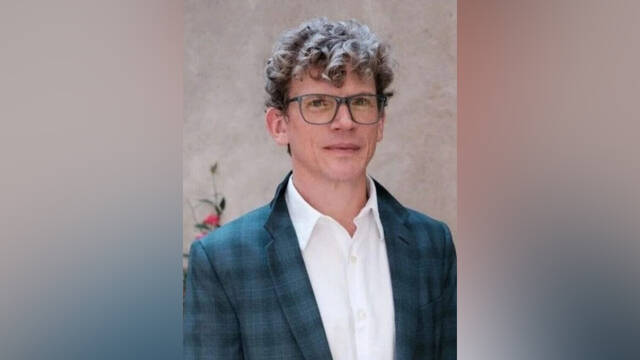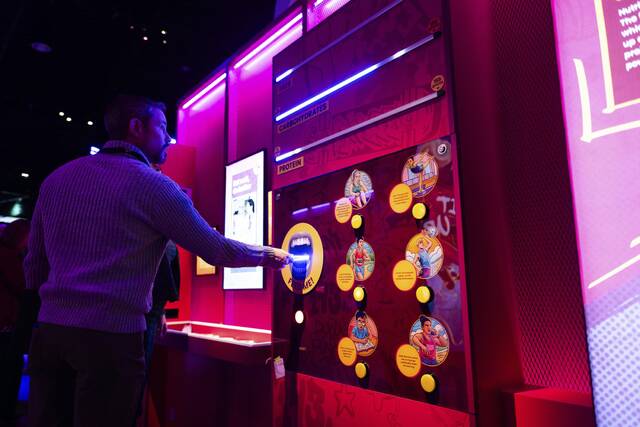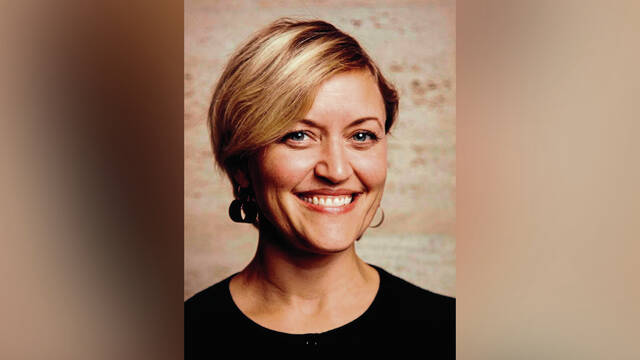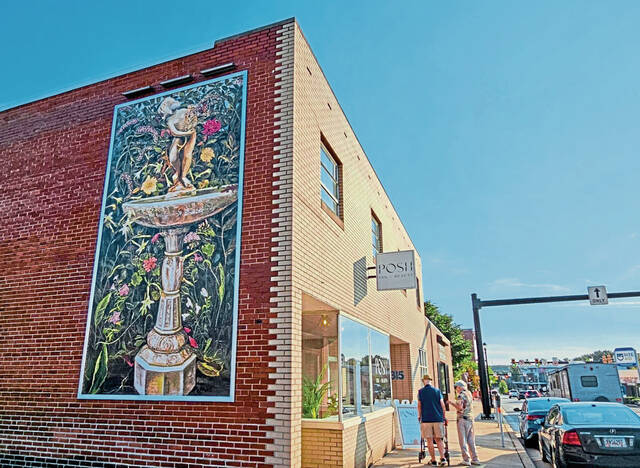Maureen Joyce peeled back the top of one of the plastic containers, revealing clay face masks inside that seemed to be looking back at her.
They were decorated in various colors – some bright and bold and others dark and dreary. Sayings are inscribed such as “It’s OK to NOT be OK,” and “I’m YOU” and “Never Enough.”
Tear marks flow from the eyes of several. Frowns were seen on others. There were hearts and flowers, too.
“Mental illness is real, and you are not alone,” said Joyce, who with artist friend Carrie Breschi is dedicated to helping people share their feelings and thoughts behind these masks.
They are part of a project called “I’m fine.” The moniker is given because people often say they are fine, but in reality, they aren’t. Creating physical masks to express themselves was an idea Breschi had. It was inspired as a way to help her friend Joyce through the loss of her son, Patrick, who died by suicide at age 30 in 2018.
Joyce, a native of Crafton, often “hides” behind a mask grieving the death of her child.
Through her intense pain, she turned to what she knows best — art. Joyce began working with clay again, channeling her energy into molding items by hand.
“It was art that brought me out of that fog and allowed me to start engaging in life again,” Joyce said. “I needed to work through how I was going to confront society. I knew I had to put on a face. I likened that face to being a mask.”
With a suggestion from Breschi to invite others to make masks, the two created this project in 2019. The traveling exhibition is now on display at Pittsburgh Center for Arts & Media in Shadyside.
They incorporated a ginkgo leaf as the apostrophe in the logo for “I’m fine.” Joyce would often find ginkgo leaves in Patrick’s pockets when he was a little boy.
According to the National Institutes of Health, extract from ginkgo leaves is promoted as a dietary supplement for many conditions, including anxiety. Ginkgo tree roots survived the atomic bombing of Hiroshima, Japan, in 1945.
That kind of resiliency is needed when dealing with adversity. It often helps to talk about it.
“It all begins with a conversation,” Joyce said. “We are doing this to show the resilience of people and to help them through the fog of trauma and loss.”
They began the journey in Cumberland County, where they live.
They kept the program going during the pandemic by providing tool kits and hosting virtual events when wearing a cloth face mask became a necessity in 2020 as a form of protection from covid-19.
But shielding others from seeing one’s true self was around before then.
“We often mask how we feel,” said Joyce, as she picked up one of the masks from the plastic container. “It’s not just about the masks. It’s about articulating in words. We have a conversation and create a safe space. This exhibition empowers makers.”
Over the past several months, the women have been hosting a series of workshops across Pennsylvania where participants create ceramic masks that represent the outward “mask” each of us wears to portray, hide or minimize our emotions and mental health challenges.
The project is partly supported by a grant from the Pennsylvania Council on the Arts. Standard Ceramic Supply Company in Carnegie donated materials. There is a healing aspect to working with clay, Joyce said.
”This thread (of masks) will tie everyone across the state together,” Breschi said.
The women do not claim to be licensed therapists.
More than 1,500 masks have been made.
Their masks as well as their stories, sculptures and interactive artwork have been on display throughout the city. The first location was Manchester Craftsmen’s Guild on Pittsburgh’s North Side in conjunction with the All City Visual Arts Exhibit. Masks were created by students from Brashear and UPREP Milliones high schools.
Nina Unitas, coordinator of visual arts and design for Pittsburgh Public Schools, said in a statement that statistics show that teens are especially vulnerable to mental health struggles.
“Students need to know that mental illness is real and that there are resources that can be helpful in their struggles,” Unitas said.
Other exhibit locations included Carnegie Mellon University and the University of Pittsburgh.
Kyle Houser, executive director of Pittsburgh Center for Arts & Media, said in a statement that mental health is an important community conversation, especially with the collateral damage from the pandemic.
Joyce’s son Patrick has inspired this project, Breschi said.
“He has guided us,” she said. “If we save one life or we bring joy to one or two lives, it’s a great feeling.”
Details: The exhibit “I’m fine.” is at Pittsburgh Center for Arts & Media, 1047 Shady Ave., Shadyside through July 22. The exhibit is free. Hours are 10 a.m. to 9 p.m. Monday through Friday, 10 a.m. to 4 p.m. Saturday. Another exhibit will be held from July 10-29 at Standard Ceramic Supply, 24 Chestnut St. in Carnegie, with a closing event in conjunction with Carnegie Arts Walk from noon to 6 p.m. July 29.
In May 2024, all of the masks will be exhibited throughout the Capitol and Harrisburg Region to address the country’s mental health crisis.


